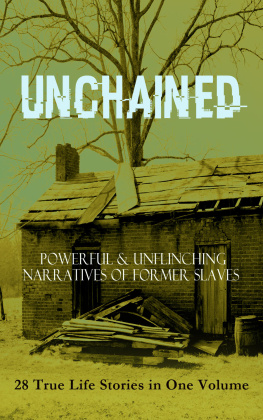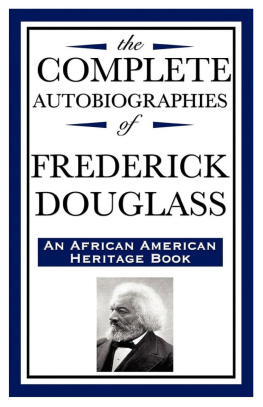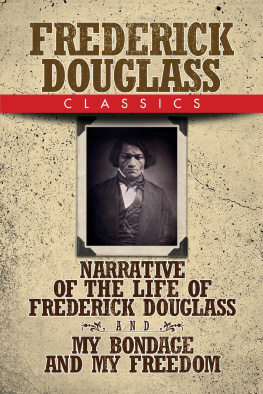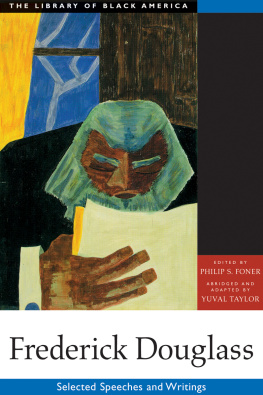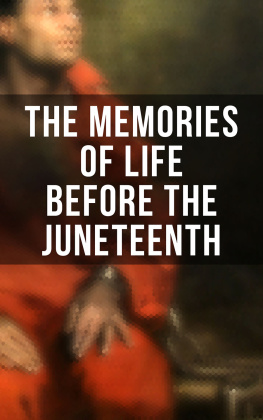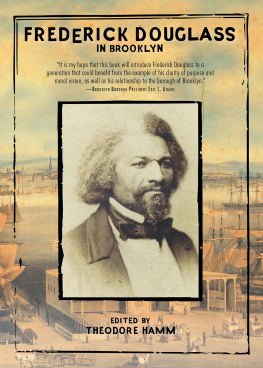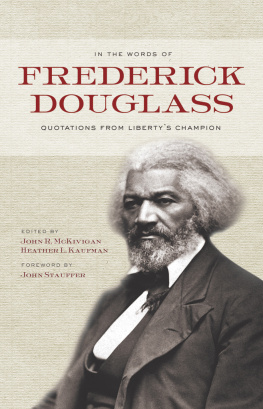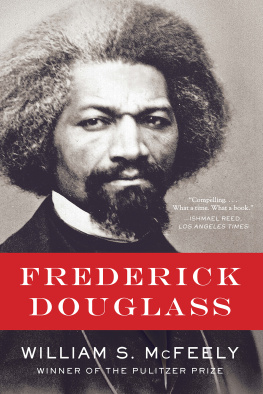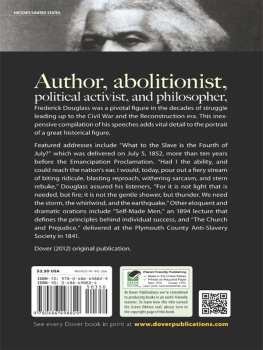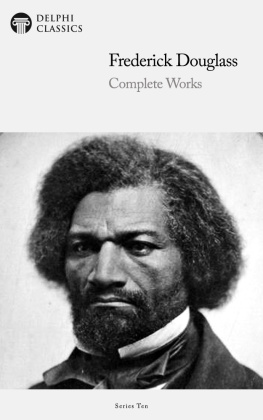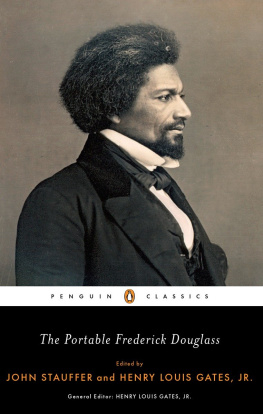The Essential Writings
Frederick Douglass
Contents:
Frederick Douglass A Biographical Primer
Narrative Of The Life Of Frederick Douglass
Preface
Letter From Wendell Phillips, Esq.
Frederick Douglass.
Chapter I
Chapter Ii
Chapter Iii
Chapter Iv
The Essential Writings, F. Douglass
Jazzybee Verlag Jrgen Beck
86450 Altenmnster, Loschberg 9
Germany
ISBN: 9783849630515
www.jazzybee-verlag.de
www.facebook.com/jazzybeeverlag
admin@jazzybee-verlag.de
Frederick Douglass A Biographical Primer
American orator and journalist, was born in Tuckahoe, Talbot county, Maryland, probably in February 1817. His mother was a negro slave of exceptional intelligence, and his father was a white man. Until nearly eight years of age, he was under the care of his grandmother; then he lived for a year on the plantation of Colonel Edward Lloyd, of whose vast estate his master, Captain Aaron Anthony, was manager. After a year he was sent to Baltimore, where he lived in the family of Hugh Auld, whose brother, Thomas, had married the daughter of Captain Anthony; Mrs Auld treated him with marked kindness and without her husband's knowledge began teaching him to read. With money secretly earned by blacking boots he purchased his first book, the Columbian Orator; he soon learned to write free passes for runaway slaves. Upon the death of Captain Anthony in 1833, he was sent back to the plantation to serve Thomas Auld, who hired him out for a year to one Edward Covey, who had a wide reputation for disciplining slaves, but who did not break Frederick's spirit. Although a new master, William Freeland, who owned a large plantation near St Michael's, Md., treated him with much kindness, he attempted to escape in 1836, but his plans were suspected, and he was put in jail. From lack of evidence he was soon released, and was then sent to Hugh Auld in Baltimore, where he was apprenticed as a ship caulker. He learned his trade in one year, and in September 1838, masquerading as a sailor, he escaped by railway train from Baltimore to New York city. For the sake of greater safety he soon removed to New Bedford, Massachusetts, where he changed his name from Frederick Augustus Washington Bailey to Frederick Douglass, Douglass being adopted at the suggestion of a friend who greatly admired Scott's Lady of the Lake. For three years he worked as a day laborer in New Bedford. An extempore speech made by him before an anti-slavery meeting at Nantucket, Mass., in August 1841 led to his being appointed one of the agents of the Massachusetts Anti-Slavery Society, and in this capacity he delivered during the next four years numerous addresses against slavery, chiefly in the New England and middle states. To quiet the suspicion that he was an impostor, in 1845 he published the Narrative of the Life of Frederick Douglass, an American Slave. Fearing his recapture, his friends persuaded him to go to England, and from August 1845 to April 1847 he lectured in Ireland, Scotland and England, and did much to enlist the sympathy of the British public with the Abolitionists in America. Before his return a sum of 150 was raised by subscription to secure his legal manumission, thus relieving him from the fear of being returned to slavery in pursuance of the Fugitive Slave Law. From 1847 to 1860 he conducted an anti-slavery weekly journal, known as The North Star, and later as Frederick Douglass's Paper, at Rochester, New York, and, during this time, also was a frequent speaker at anti-slavery meetings. At first a follower of Garrison and a disunionist, he allied himself after 1851 with the more conservative political abolitionists, who, under the leadership of James G. Birney, adhered to the national Constitution and endeavored to make slavery a dominant political issue. He disapproved of John Brown's attack upon Harper's Ferry in 1859, and declined to take any part in it. During the Civil War he was among the first to suggest the employment of negro troops by the United States government, and two of his sons served in the Union army. After the war he was for several years a popular public lecturer; in September 1866 he was a delegate to the national Loyalist convention at Philadelphia; and in 1869 he became the editor, at Washington, of a short-lived weekly paper, The New National Era, devoted to the interests of the negro race. In 1871 he was assistant secretary of the Santo Domingo commission, appointed by President Grant. He was marshal of the District of Columbia from 1877 to 1881, was recorder of deeds for the district from 1881 to 1886, and from 1889 to 1891 was the American minister resident and consul-general in the Republic of Haiti. He died in Anacostia Heights, District of Columbia, on the 20th of February 1895. He was widely known for his eloquence, and was one of the most effective orators whom the negro race has produced in America.
Narrative Of The Life Of Frederick Douglass
PREFACE
In the month of August, 1841, I attended an anti-slavery convention in Nantucket, at which it was my happiness to become acquainted with FREDERICK DOUGLASS, the writer of the following Narrative. He was a stranger to nearly every member of that body; but, having recently made his escape from the southern prison-house of bondage, and feeling his curiosity excited to ascertain the principles and measures of the abolitionists,of whom he had heard a somewhat vague description while he was a slave,he was induced to give his attendance, on the occasion alluded to, though at that time a resident in New Bedford.
Fortunate, most fortunate occurrence!fortunate for the millions of his manacled brethren, yet panting for deliverance from their awful thraldom!fortunate for the cause of negro emancipation, and of universal liberty!fortunate for the land of his birth, which he has already done so much to save and bless!fortunate for a large circle of friends and acquaintances, whose sympathy and affection he has strongly secured by the many sufferings he has endured, by his virtuous traits of character, by his ever-abiding remembrance of those who are in bonds, as being bound with them!fortunate for the multitudes, in various parts of our republic, whose minds he has enlightened on the subject of slavery, and who have been melted to tears by his pathos, or roused to virtuous indignation by his stirring eloquence against the enslavers of men!fortunate for himself, as it at once brought him into the field of public usefulness, "gave the world assurance of a MAN," quickened the slumbering energies of his soul, and consecrated him to the great work of breaking the rod of the oppressor, and letting the oppressed go free!
I shall never forget his first speech at the conventionthe extraordinary emotion it excited in my own mindthe powerful impression it created upon a crowded auditory, completely taken by surprisethe applause which followed from the beginning to the end of his felicitous remarks. I think I never hated slavery so intensely as at that moment; certainly, my perception of the enormous outrage which is inflicted by it, on the godlike nature of its victims, was rendered far more clear than ever. There stood one, in physical proportion and stature commanding and exactin intellect richly endowedin natural eloquence a prodigyin soul manifestly "created but a little lower than the angels"yet a slave, ay, a fugitive slave,trembling for his safety, hardly daring to believe that on the American soil, a single white person could be found who would befriend him at all hazards, for the love of God and humanity! Capable of high attainments as an intellectual and moral beingneeding nothing but a comparatively small amount of cultivation to make him an ornament to society and a blessing to his raceby the law of the land, by the voice of the people, by the terms of the slave code, he was only a piece of property, a beast of burden, a chattel personal, nevertheless!



